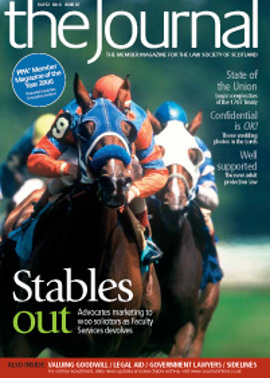Dean urges solicitors to stay with fee scheme

Dean urges solicitors to stay with scheme for counsel’s fees
Dear Member,
It has been reported on the websites of the Society and of the Journal that a number of members have voted to withdraw from the Scheme for Accounting for and Recovery of Counsel’s Fees which is in existence with the Faculty of Advocates. Before the Society makes any final decision on this matter, I should like to take the opportunity to set out the background and to explain why I believe that the existence of the Scheme is of mutual benefit to solicitors and advocates.
The origins of the Scheme lie in the fact that advocates cannot enter into a contract with either the client or the solicitor, and as a result have no right to sue for fees. The fact that the fee of an advocate is an honorarium rather than a contractual entitlement is well established in the common law of Scotland and elsewhere, and has recently been reaffirmed by the Judicial Committee of the Privy Council. In England and Wales, a statutory provision was enacted in 1990 which permitted barristers to enter into contracts with their clients, but it does not apply to Scotland.
An advocate is therefore dependent upon the solicitor to ensure that when instructions are given, the solicitor’s client has been judged as able to pay the fees for the work. That is a matter solely within the control of the solicitor, and he may either refuse to accept instructions from someone who is unlikely to pay, or require a payment to account. The advocate has no such opportunity to judge the client’s ability to pay and must depend on the instructing solicitor to do so. This relationship between the instructing solicitor and the advocate, and the opportunity for the solicitor to judge the client in advance, is a reason why it is well recognised that it is a professional obligation on a solicitor to make payment of counsel’s fees.
As a result of the fact that advocates cannot enforce the payment of fees in the way available to other professions, including solicitors, other mechanisms have developed over the years to provide to the bar steps which may be taken in the event of non-payment. In Scotland, as well as in England and Wales and other similar jurisdictions, a system has evolved of the bar establishing a list of solicitors or firms of solicitors who instructed work but in which the fees due have not been paid. While such lists do not provide directly any enforcement against a solicitor who is in default, at least they provide an opportunity for the bar to publicise what they regard as unprofessional conduct on the part of solicitors. The purpose of course is to avoid a repetition of such an event.
Such a system has existed in Scotland for many years, and in 1987 the first scheme was devised in the form of an agreement between the Society and the Faculty of Advocates for the purpose of regulating when fees ought properly to be regarded as due by a solicitor. The scheme was of advantage to solicitors because it allowed fees which had been rendered to be paid in blocks, and it defined the stages in a case when fees would become due. This had the effect of setting out clearly when a fee was due and when it was overdue. As a result the circumstances in which the sanctioning of a firm by the Dean of Faculty might be justified in the event of default were agreed between the Society and Faculty.
As will be obvious, the creation of a sanctions list such as that operated by the Faculty, in which the Dean notifies all members of Faculty that a firm of solicitors has been in default, and that instructions should not be received from that firm other than accompanied by full payment for the work instructed, does not depend upon any agreement with either the Society or with solicitors individually. The ability to create such a sanctions list is a matter entirely within the jurisdiction of the Faculty, and the benefit of the Scheme has been to regulate the circumstances in which sanctions would be operated, taking into account the interests of both the solicitor and advocate.
The Scheme was last revised in 2002, at which time the Joint Liaison Committee was created for the purpose of adjudicating upon all outstanding fees which fell within the scope of the Scheme and making recommendations to the Dean as to whether sanction would be appropriate. The result is that as Dean since 2004, I have not placed any solicitor on the sanctions list without a recommendation to that effect from the Committee. As a matter of policy, I have regarded it as appropriate not to reject any recommendation unless there existed exceptional circumstances to justify doing so.
The Joint Liaison Committee includes practising solicitors and practising advocates. A solicitor in respect of whom a fee appears to be due has every opportunity to put forward any reasonable justification for payment not being required, and in that situation the committee may decide not to recommend to the Dean that sanctions should be applied. The result is a mechanism whereby the interests of both solicitors and advocates are properly taken into account by members of the respective professions before a decision is made to recommend the inclusion of a solicitor on the sanctions list, and in acting upon such a recommendation the Dean of Faculty has a proper objective basis for doing so.
I am aware that concerns have been caused because of the recent expansion of direct access by members of the Faculty of Advocates. Direct access to advocates has existed for some time. For example, advocates have traditionally been able to accept instructions from local authorities and other public bodies notwithstanding that the instruction does not come from a Scottish solicitor. Advocates have also been entitled traditionally to receive instructions from members of other professions, including solicitors and lawyers from other countries, accountants and patent agents. Since 1991 the arrangements for direct professional access have allowed instructions to be received from professions other than solicitors, and more recently our direct access rules have expanded the scope of those who may instruct.
The critical difference between instructions from a Scottish solicitor and instructions from any other category of person is that instructions in relation to court work may only come from a solicitor holding a practising certificate in Scotland. This means that in any case in which litigation is involved, a member of the Law Society of Scotland is required to give the instruction, and in relation to court work, an advocate is also subject to the “cab rank rule” as a result of which such instructions cannot be refused other than in specified circumstances such as unavailability due to another instruction already received. This obligation upon advocates always to accept such instructions for court work does not apply to any other category of work in which instructions may be received from persons other than solicitors.
In all cases where instructions are received by an advocate, the prohibition against the advocate entering into a contract either with the client or the person instructing applies. Were it to be the case that a person other than a solicitor had instructed an advocate and had failed to make payment of the fee properly due to the advocate, then as Dean I would have no hesitation in applying a sanctions list approach to that person.
I believe that the existence of the Scheme therefore provides benefits to both solicitors and advocates. It must obviously be subject to regular review and revisal where appropriate, but it would be regrettable if it were to be abandoned altogether. That is not the desire of the Faculty, nor is it mine.
If there were no such Scheme at all, it would not prevent the Dean of Faculty operating sanctions against solicitors and other persons instructing advocates. The existence of an agreement with the Society is not necessary for sanctions to be applied.
Yours sincerely,
Roy L Martin QC
[The matter will be considered at the June meeting of Council. We hope to publish a comment from the Society in the July issue. – Editor.]
In this issue
- Court plans with little appeal
- Winning ways
- Forward steps
- Bar to progress
- Dean urges solicitors to stay with fee scheme
- The Union and the law
- Public and confidential
- Adult support: a new generation
- Advice deserts and PDSOs
- Vision 20:20
- Benevolent Fund: a much valued support
- Termites in the basement
- The value of goodwill
- Letters of Engagement Roadshow
- A door almost shut
- Lessons in improvements
- Null from the outset?
- The Tevez affair
- Scottish Solicitors' Discipline Tribunal
- Website reviews
- Book reviews
- Held in check
- Possession undisturbed






